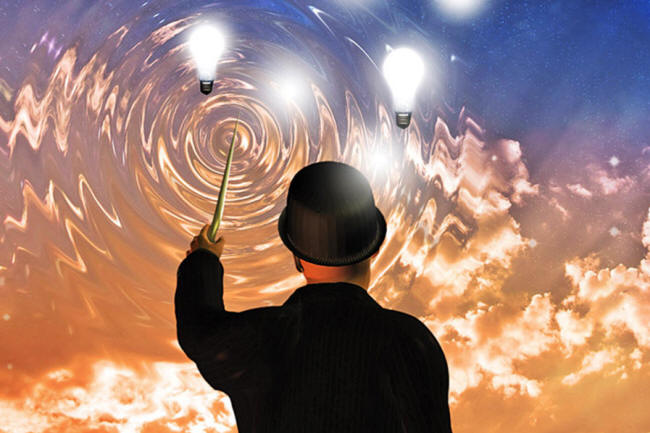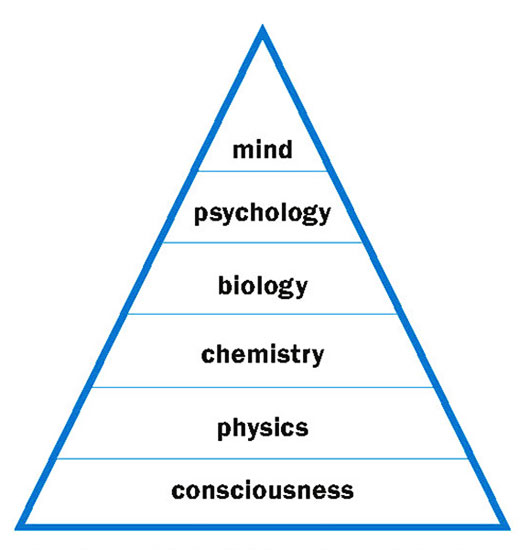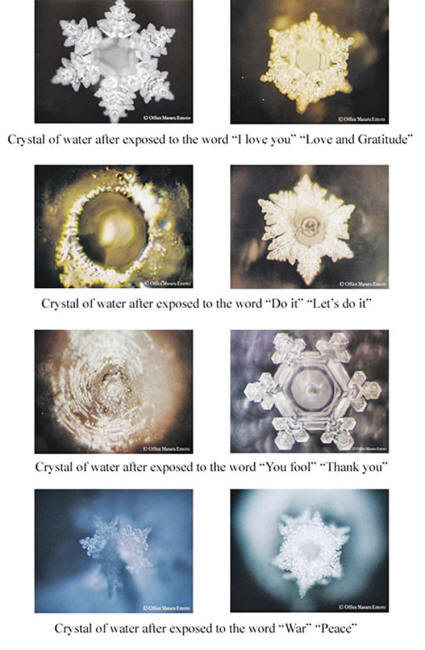|

by Dean Radin
New Dawn
Special Issue,
Vol 12 No 5 -
October 2018
from
NewDawnMagazine Website
Spanish version

The word "real" in the title distinguishes the type of magic we're
discussing. This is not about the fictional magic of Harry Potter or
the fake magic of Harry Houdini.
This is about
real magic,
which falls into three main categories:
-
divination, or
perception of events distant in space or time
-
force of will, or
mental influence of the physical world
-
theurgy, or
interactions with nonphysical entities
In my book
Real Magic
(Harmony, 2018), I describe how these traditional, esoteric forms of
magic (occultists use the term "magick") have been scientifically
studied for over a century, and why the accumulated evidence in
favor of real magic is now overwhelmingly positive.
This assertion might be
surprising given that college textbooks teach us that magic is
merely an ancient superstitious belief.
But textbooks are
regularly revised and updated as science marches on, and at the
leading edge of science today we're finding that some of the ancient
ideas about magic are actually correct...
Science and magic appear to
be converging.
How do we know this?
One strong indication appeared in May 2018. The American
Psychological Association (APA) is the principal organization
for academic and clinical psychologists, with nearly 120,000 members
worldwide.
Its flagship journal is
the august American Psychologist.
In the May 2018 issue, a
lead article was entitled,
"The Experimental
Evidence for Parapsychological Phenomena - A Review."
The author was Etzel
Cardeña, a psychology professor at Lund University in Sweden.
After analyzing ten
classes of experiments exploring psychic effects ("psi" for short),
the article's conclusion was unequivocal:
"The evidence for psi
is comparable to that for established phenomena in psychology
and other disciplines."
That this article
appeared in the conservative voice of academic psychology cannot be
overstated.
There are many other signs.
For example, University
of California statistics professor Jessica Utts was President
of the American Statistical Association (ASA) in 2016.
The ASA is the world's
largest organization of academic and professional statisticians. In
her Presidential Address in 2016, Utts mentioned that one area she
had studied in detail for the US government was parapsychology.
She said:
"The data in support
of precognition and possibly other related phenomena are quite
strong statistically and would be widely accepted if they
pertained to something more mundane."
These are just two
examples, but there is an increasing number of scientists who are
willing to say to their peers, in public, that based on evaluation
of the experimental evidence, psi exists.
This is hardly news to
the majority of the general public who already believe this, but
among many scientists the mere possibility that psi might be real
has been such a contentious issue that few were willing to express
such positive opinions in public.
The reason for the
ongoing debate has had very little to do with the evidence and very
much to do with the scientific worldview - that collection of ideas
that form how science understands reality and our place in it.
The debate over psi has persisted for hundreds of years because
generations of students have been taught that psi violates one or
more unspecified laws of physics, and so any claims about it, either
experiential or experimental, must be mistaken.
This belief has forced
psi out of the academic mainstream, and its marginal status has had
important consequences.
As the late Irvin
Child, former chair of the psychology department at Yale
University, wrote in 1985 in American Psychologist:
Books by
psychologists purporting to offer critical reviews of research
in parapsychology do not use the scientific standards of
discourse prevalent in psychology.
Experiments… on
possible extrasensory perception (ESP) in dreams… have received
little or no mention in some reviews to which they are clearly
pertinent.
In others, they have
been so severely distorted as to give an entirely erroneous
impression of how they were conducted.
We see these distortions
starkly reflected in the contemptuous way that Wikipedia articles
describe topics in parapsychology.
This is a pity, not only
because psi phenomena are extremely common human experiences, but
because the state of the scientific evidence is so strong.
Still, many journalists
within
the "serious" media continue to portray such experiences at
best as spooky or silly, and at worst as a sign of mental illness.
Despite the evidence,
it's not surprising that this topic has become an entrenched taboo.
I explored where this taboo came from, and why it persists, in Real
Magic. I surveyed the history of the esoteric traditions, the
classes of magical practices, magic's relationship to psi, what
scientific tests tell us about magic, and why leading-edge
scientific ideas are suggesting a science/magic convergence.
The bottom line was as
follows:
When you survey
10,000 years of esoteric history, ranging from
shamanism through Neoplatonism, Hermeticism, the Kabbalah, Gnosticism, the
Rosicrucians, the Free Masons, and so on, you find that they are
all based on a single perennial wisdom that can be summarized in
three words:
Consciousness
is
fundamental...
By consciousness, I mean
a primordial, universal awareness, a perplexing type of "substance"
that's woven into the fabric of reality.
From this esoteric
worldview, scientific concepts like space, time, energy, and matter
are said to emerge out of a universal consciousness.
It also means
that our personal sense of awareness, our self-consciousness, is
composed of the same stuff.
The esoteric traditions tell us that
ultimately you are the universe...
That is, universal
awareness is the source of everything, including our bodies, brains,
minds, and that spark of awareness within you that you call "me."
This is the source of the
affirmation mantra "you create your own reality," and it is meant in
a literal sense.
The esoteric worldview
makes it far easier to understand psi experiences like telepathy and
clairvoyance because the idea that awareness spans all space and
time, and that it can manifest the physical world, is simply a
consequence of the nature of consciousness itself.

Dean Radin proposes a more comprehensive
knowledge hierarchy which places Consciousness
(C) at the bottom to indicate where the physical
world emerges from.
At the top of the pyramid is Mind, meaning the
brain's machinery involved in information
processing, cognition and perception.
From this perspective, he says,
"we enjoy conscious awareness not because
the brain generates it, but because (C)
permeates every layer of the physical world,
just like electrons permeate every later
'above' the discipline of physics.
Based on his hierarchy, which maintains
everything currently known in science… magic
is no longer an impossible 'anomaly'."
What does this have to do
with real magic?
Real magic is,
the pragmatic application of the esoteric worldview,
just like today's technologies are the application of the scientific
worldview.
That is, if consciousness
is indeed as fundamental as the esoteric traditions claim, then
magic must be genuine because awareness is primary over the physical
world.
Thus, we have the
capacity to transcend the limits of space and time, and we can
determine (to a small extent) how the physical world emerges.
Further, human embodiment can now be seen as just one way, among a
potentially infinite number of other ways, that consciousness can
manifest into a physical being.
Why aren't there university-based departments of magic?
Why can't we
earn an accredited advanced degree in magical practice?
The usual answer is that,
the esoteric worldview is so radically different from today's
scientific worldview that it cannot possibly be true...
But that's
only because the scientific worldview as portrayed in the typical
college textbook is five to ten years out of date.
The leading edge today in
science, represented by articles and books written by mainstream
thought-leaders in physics, mathematics, and the neurosciences, is
proposing that,
reality is literally made out of information...
That is, the emerging
scientific worldview tells us that reality is not composed of matter
or energy, but rather of something far stranger, more abstract, and
much closer to the esoteric worldview than the materialistic
perspective that's commonly associated with science.
Theoretical concepts aside, how can science study magic?
Here's an example
involving tests of the magical force of will.
These studies were
sparked by asking why ancient practices of blessing food, water, and
wine are still vibrantly alive in the modern world.
Indeed, proposing toasts
with wine and spirits are as popular today as they have been
throughout history.
Anthropologists who study these practices have found that wine has
been a popular beverage for at least 8,000 years. Its popularity was
partially due to its pleasant psychoactive properties, but also
because it was much safer to drink than water.
Drinking from a pond, a
river, or a well can be dangerous because the water might be
contaminated. In ancient times (and still today), it was not easy to
tell if water was safe or hazardous, and the alcohol in wine tended
to neutralize most of those dangers.
Besides becoming a common beverage, wine was also associated with
special or "holy" properties. It was celebrated by devotees of the
Greek god Dionysus, and it was incorporated into the Catholic belief
of transubstantiation.
In these contexts, the
belief was that divinely inspired intentions could alter the
properties of wine, and this belief remains an act of faith for many
today.
But here's the rub:
Does anything
actually happen to the wine that can be detected without having
to rely on faith or anecdotal reports?
Research anthropologist
Stephan Schwartz conducted a series of experiments to find
out.
In each test, he took a
bottle of Cabernet Sauvignon, separated it into two carafes of equal
volume, and then asked a small group of meditators to intentionally
bless one of the carafes for 20 to 30 minutes.
Then he randomly labeled
one A, the other B, and set the two carafes aside. Later, he asked a
host of a dinner party to run a taste test.
The host didn't know that
one carafe contained blessed wine and the other contained unblessed
or "control" wine. The host told her guests that a friend was
considering buying several cases of wine and he wanted to see which
one was preferred.
The guests tasted each
wine and marked on a card which one they preferred. The host then
evaluated the group's preference, told them the result, and thanked
them for participating.
Over 12 such parties, involving a total of 93 meditators involved in
blessing the wine, and 84 party guests, the results were clear.
In 11 of the parties
the tasters preferred the blessed wine, and in one party the
preference was a tie.
The odds against chance
for this outcome was 2,000 to 1, indicating that under double-blind
conditions the blessed wine tasted better than the non-blessed wine.
This is an astounding
outcome because wine-tasting is a highly complex process involving
not just taste and smell, but sophisticated forms of cognitive
processing, and neither the host or the party guests knew that they
were tasting wine from exactly the same bottle.
Something had happened to
the wine as a result of the blessing.
This was not the only experiment to find that focused intention
altered properties of a beverage.
The late Dr
Masaru Emoto claimed that,
conscious intention
could change the shape of frozen water crystals, such that
pleasant thoughts would result in beautiful, symmetric crystals,
while bad thoughts would result in displeasing, misshaped
crystals.
Emoto
published many books showing
results of his tests, but much of that work was more along the lines
of artistic efforts rather than controlled experiments, so most
scientists were not impressed by his claims.

Dr Masaru Emoto (1943–2014),
the
Japanese scientist and water researcher,
revealed the true nature of water and how
thoughts and vibrations affect the molecular structure
of water.
After attending a lecture Emoto presented in 2005, we asked if he
would be willing to participate in a double-blind, scientific study.
He agreed, and in our
collaboration the technician who took the photos of the frozen
water crystals (above video) did not know if the water used to create the
crystals was blessed or not blessed.
The blessing in our
study was performed by a group of 2,000 people who focused their
intentions on bottled water from a commercial source.
The unblessed,
control water, was another bottle from the same source and
purchased at the same time.
The results showed
that the blessed water produced more beautiful crystals, as
assessed by independent judges. This supported Dr Emoto's claim.
Later, we conducted a
more rigorously controlled triple-blind study, which again
supported his claim.

In his years of water research,
through high speed photography of thousands of water crystals,
Dr Emoto showed the most beautiful crystals are those
formed
after the water is exposed to the words 'love' and 'gratitude'.
His claims were subsequently backed up by
rigorous scientific experiments completed by Dean Radin and
associates.
Source
We followed that up by testing if pieces of a gourmet brand of
chocolate blessed by Buddhist monks and a Mongolian shaman would
improve the mood of people who ate that chocolate, as compared to
people who ate the same but not-blessed chocolate.
Again,
under
double-blind, placebo-controlled conditions, we found a
statistically significant elevation in mood among those who ate the
blessed chocolate.
Later, we tried a similar
experiment with people in Taiwan using oolong tea blessed by
Buddhist monks.
Again,
people drinking
the blessed tea reported statistically significant elevations in
mood as compared to people drinking unblessed tea from the same
source.
In these studies, we did not investigate which physical properties
of wine, water, or food were altered by the blessing. But something
clearly was affected...
Over the past century, many other scientific experiments have
explored the effects of focused intention on physical systems
ranging from elementary particles, to water, bacteria, seeds, plant
growth, red blood cells, electronic circuits, and human physiology
(I describe these in
Real Magic).
These experiments demonstrate that modern scientific tools and
techniques can be applied to
ancient magical 'beliefs,' and that when
the lens of science is used to inspect magic, to our surprise we
find that some of those beliefs are actually true.
As science on these
topics slowly advances, we may be rediscovering why these ancient
practices have persisted for millennia:
because they work...
Explaining exactly how
they work is becoming a topic of discussion at the leading edges of
science today.
Despite evidence for an imminent science/magic convergence, we may
not see Harvard announcing its new Department of Magical Studies any
time soon.
Ancient taboos about
magic are still very much alive, and those prohibitions tend to
reinforce all sorts of fears:
Such concerns have
prevented the academic world from openly and seriously acknowledging
the coming convergence, even though it's unfolding right in front of
our eyes.
Fortunately the taboo is beginning to crumble because of,
-
the
popularity of books on affirmations and the law of attraction
-
the
fast-rising mainstreaming of alternative healing therapies
-
development of new tools for enhancing intuition
-
the popularity of
mindfulness meditation
-
the blockbuster success of superhero feature
films,
...and in general the flourishing of "positive psychology."
Given the many challenges faced by the modern world, I believe we
would all benefit by encouraging the unprejudiced
study of real
magic, especially because this topic is really about gaining a
better understanding of the nature of consciousness.
Indeed, a case can be made that expanding what we know
about
consciousness may be a prerequisite for humanity to evolve from our
present adolescence phase - which like all adolescents is
chronically permeated by angst and emotion - to a more mature phase
where concepts like wellness for all and "peace on Earth"
become
genuine, realistic possibilities...
| 




